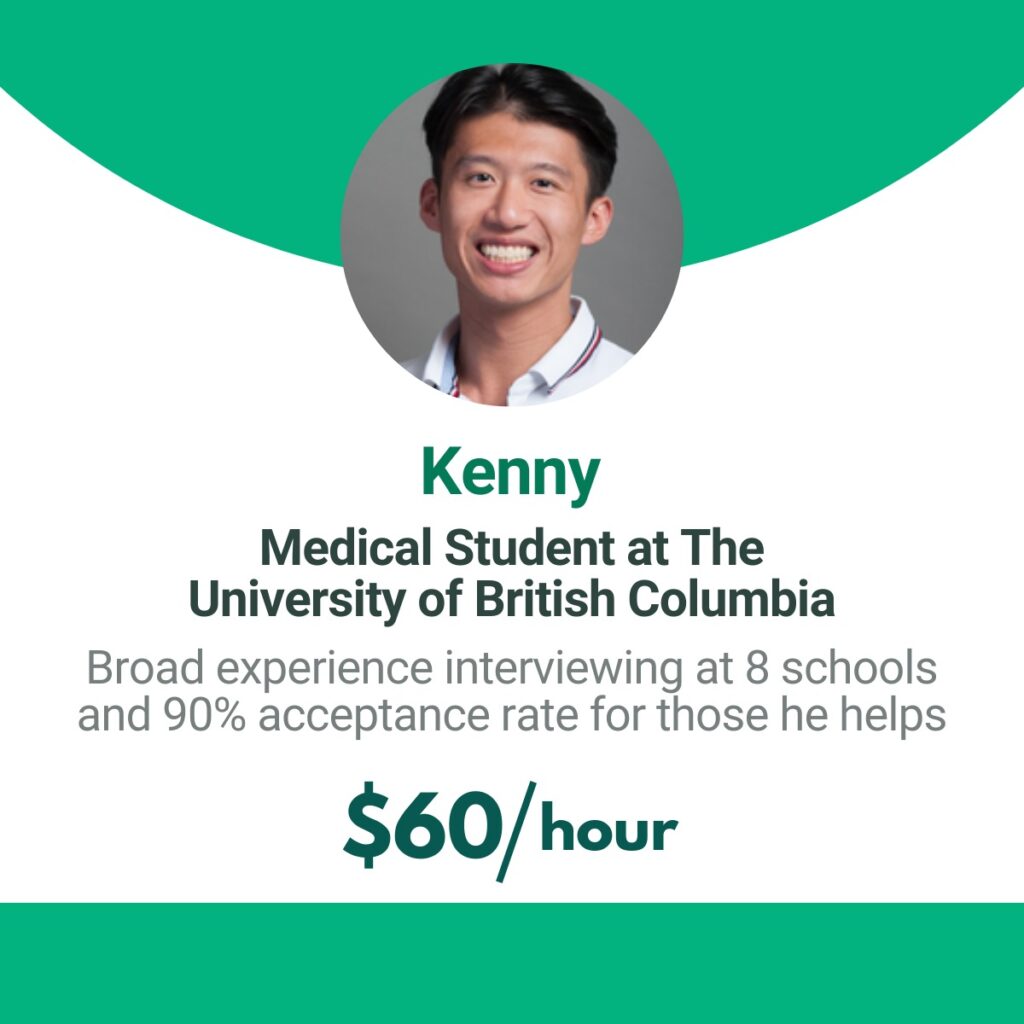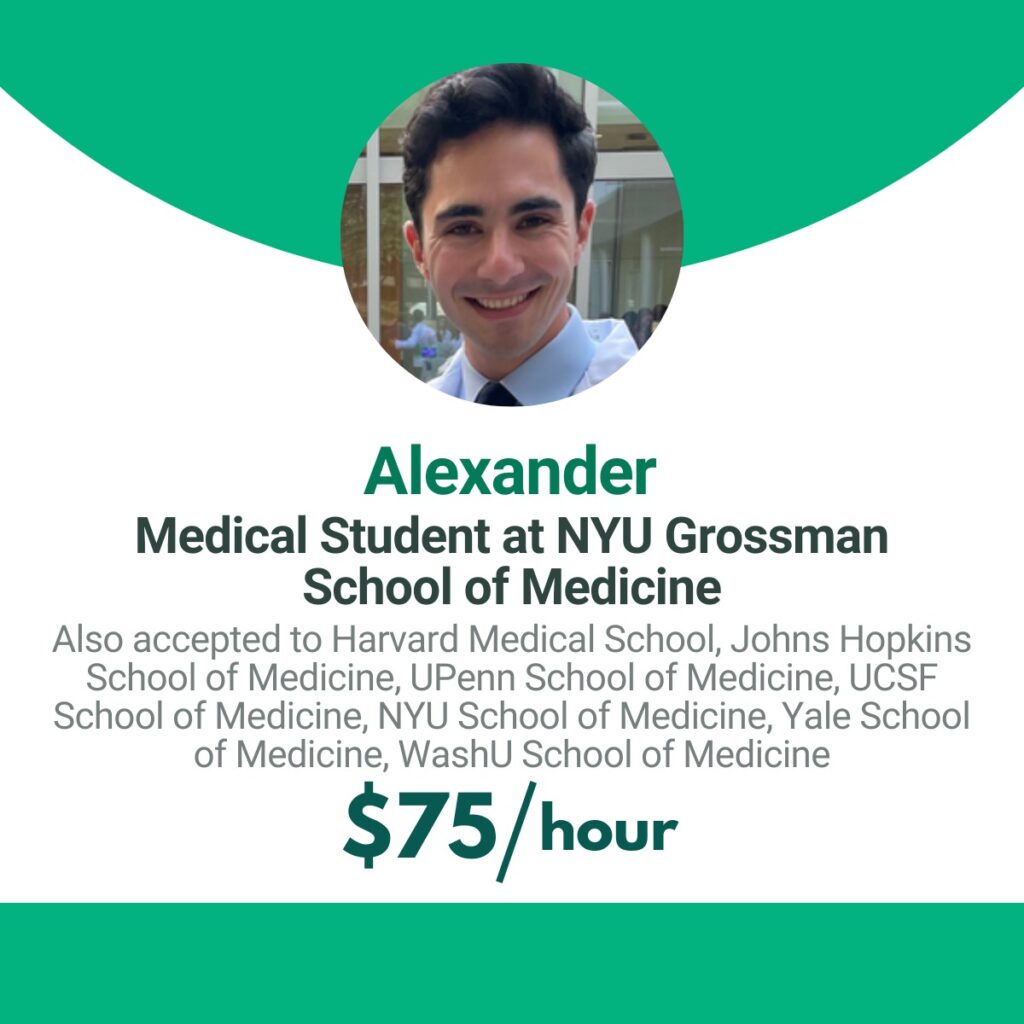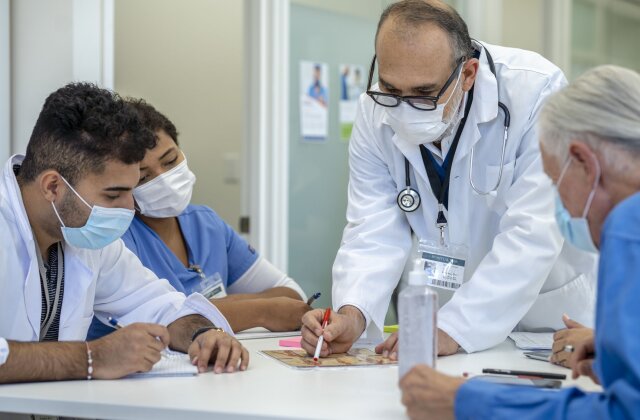Last updated on January 3rd, 2025 at 04:42 am

Understanding Nontraditional Applicants
-Defining nontraditional applicants in the medical school admissions process.
-Discussing the various categories of nontraditional applicants
-Emphasizing the value of diversity and the qualities of nontraditional applicants
Crafting a Compelling Narrative
-The significance of articulating a strong motivation for pursuing a medical career.
-Linking personal experiences, background, and aspirations to a coherent narrative
Strengthening Your Application Materials
-Utilizing extracurricular activities, volunteer work, and research experiences
-Advising nontraditional applicants to strategically target their efforts
Navigating Academic Requirements
-Exploring the role of coursework in medical school admissions.
-Addressing the potential challenges of lacking science prerequisites
-Suggesting strategies for nontraditional applicants to excel in relevant coursework
Mastering the MCAT and Standardized Testing
-Discussing the impact of MCAT scores and GPA on the admissions process.
-Providing guidance on creating a comprehensive MCAT study plan
Building Strong Letters of Recommendation
-Highlighting the significance of recommendation letters for nontraditional applicants.
-Identifying suitable references based on individual circumstances
-Emphasizing the importance of recent relationships
Introduction
Are you ready to embark on an exhilarating journey that defies convention? Brace yourselves, future healers, because the world of medical school admissions has undergone a remarkable transformation, welcoming a dynamic influx of Non-Traditional Medical School Applicants. Step aside, cookie-cutter candidates; today’s medical schools are celebrating the diversity and distinctive experiences that nontraditional applicants bring to the hallowed halls of medicine. College students, gather ’round, because this is your invitation to revolutionize the status quo and chart a unique path to your dream of donning that coveted white coat.
Gone are the days when medical school was solely the realm of the straight-A science prodigies. Picture this: the passionate artist with a flair for storytelling, the seasoned professional hungry for a new challenge, the philosopher yearning to heal beyond the mind. They’re all boldly stepping into the realm of medicine, each with a tale that’s as varied as the colors on an artist’s palette.
As we plunge into the captivating world of Non-Traditional Medical School Applicants, let’s shatter the myths that once confined medical school candidates to a single mold. With the power of adaptability, a passion for making a difference, and the unwavering determination to wear the stethoscope, this generation of applicants is turning the medical admissions landscape into a canvas of innovation.
In this guide, we’ll unravel the secrets of conquering medical school admissions as a nontraditional trailblazer. From crafting a compelling narrative that resonates with admissions committees to navigating the labyrinth of prerequisites, standardized tests, and recommendation letters, we’ve got your back. So, fasten your seatbelts, because we’re about to embark on a thrilling odyssey that will redefine the very essence of what it means to be a medical school applicant. Welcome to the realm of Non-Traditional Medical School Applicants – where uniqueness is celebrated, and the road less traveled leads to an extraordinary future.
Understanding Nontraditional Applicants
In the electrifying world of medical school admissions, the rise of Non-Traditional Medical School Applicants is nothing short of a revolution. These dynamic individuals, whose paths to medicine meander through diverse experiences and unconventional backgrounds, are redefining the very fabric of the medical admissions landscape. It’s time to dive into the intriguing realm of nontraditional applicants, unraveling their unique stories, and highlighting the exceptional qualities they bring to the noble pursuit of medicine.
“Defining Nontraditional Applicants in the Medical School Admissions Process”
Gone are the days when a linear trajectory through the sciences was the sole gateway to medical school. Nontraditional applicants are those who take an unconventional route to medical education, deviating from the traditional path of entering medical school immediately after completing a science-focused undergraduate degree. These brave individuals encompass a spectrum of experiences, from career changers seeking a higher calling to mature students looking to fulfill a lifelong dream. Their diverse backgrounds enrich the medical field, fostering innovation and broader perspectives.
“Discussing the Various Categories of Nontraditional Applicants”
The realm of nontraditional applicants is as diverse as the field of medicine itself. Let’s unravel the distinct categories that fall under this umbrella, revealing the multitude of paths that lead aspiring healers to medical school:
Mature Students: These determined individuals bring a wealth of life experiences to the table, having embarked on unconventional journeys before deciding to pursue a medical career. With an abundance of wisdom and adaptability, mature applicants offer a unique blend of real-world insights and a deep commitment to patient care.
Career Changers: Picture the lawyer who’s witnessed the complexities of human rights battles or the engineer who’s tackled intricate design challenges. Career changers infuse the medical field with fresh perspectives, drawing from their previous vocations to enhance problem-solving skills and patient interactions.
Non-Science Backgrounds: From artists to linguists, the nontraditional realm embraces those whose undergraduate studies might not have revolved around the sciences. These individuals bring creativity, empathy, and a well-rounded understanding of human nature to the forefront of medical practice.
“Emphasizing the Value of Diversity and the Qualities of Nontraditional Applicants”
In an era where healthcare is evolving faster than ever, the infusion of nontraditional applicants is a breath of fresh air. The medical community recognizes the immense value that diversity brings, both in terms of background and thought. These applicants possess qualities that extend beyond GPAs and MCAT scores, adding an array of strengths to the medical profession:
Adaptability: Nontraditional applicants have already demonstrated the ability to pivot and thrive in diverse environments. This agility prepares them to navigate the dynamic challenges of a medical career with finesse.
Empathy: Life experiences shape perspectives, and nontraditional applicants’ unique backgrounds foster exceptional empathy. Their capacity to connect with patients on a deeper level enhances the patient-doctor relationship.
Problem-Solving: The rich tapestry of experiences nontraditional applicants bring sharpens their problem-solving skills, enabling them to approach medical challenges from fresh angles and devise innovative solutions.
Communication: Whether communicating complex ideas to a jury or conveying artistic nuances to an audience, nontraditional applicants possess superior communication skills. This proficiency enhances patient education and interdisciplinary collaboration.
As we delve deeper into the world of Non-Traditional Medical School Applicants, prepare to be inspired by the journeys of those who’ve ventured off the beaten path. From mature students who’ve accumulated a wealth of life wisdom to career changers who bring a kaleidoscope of experiences, these individuals enrich the medical field with diversity, innovation, and a profound commitment to healing. The next sections will explore how these extraordinary applicants can successfully navigate the labyrinthine process of getting into medical school.
Crafting a Compelling Narrative
In the riveting world of medical school admissions, crafting a compelling narrative becomes your compass, guiding you through the labyrinthine journey of becoming a Non-Traditional Medical School Applicant. Your narrative is more than a mere story; it’s a strategic masterpiece that unveils your motivations, experiences, and aspirations, all artfully woven into a tapestry that aligns seamlessly with your pursuit of a medical career. Buckle up as we navigate the art of storytelling that propels you towards your dream of donning the white coat.
The Significance of Articulating a Strong Motivation for Pursuing a Medical Career
Beyond the impressive transcripts and test scores, admissions committees seek candidates whose motivations resonate with the essence of medicine. Your journey into medicine as a nontraditional applicant deserves a spotlight that illuminates the “why” behind your aspirations. This isn’t just about ticking off checkboxes; it’s about crafting a genuine and passionate narrative that sets you apart. Diving into the depths of your desire to make a difference, your narrative must reflect an unwavering commitment to patient care and a profound understanding of the responsibilities that come with a medical profession.
Importance of Having a Convincing and Detailed Answer to the Question: “Why Do You Want to Be a Doctor?”
Picture this: You’re face-to-face with an admissions interviewer, and they lean forward, asking, “Why do you want to be a doctor?” Your answer shouldn’t just scratch the surface; it should evoke the very essence of your journey. Nontraditional applicants bring diverse experiences, and your response should encapsulate how these experiences have crystallized into an unshakeable desire to embark on a medical career. This isn’t just about reciting a rehearsed script; it’s about conveying authenticity and depth, painting a vivid picture of your passion for healing, and underlining your readiness to tackle the challenges of the medical world head-on.
Linking Personal Experiences, Background, and Aspirations to a Coherent Narrative
Your life experiences, irrespective of their unconventional nature, contribute to the symphony that is your narrative. The magic lies in the orchestration: harmonizing seemingly disparate elements into a melody that resonates with the admissions committee. Here’s where your nontraditional background shines. Whether you’re a mature student who’s navigated a myriad of life’s challenges or a career changer whose journey inspired a shift toward medicine, each thread in your life’s fabric adds depth to your narrative. Skillfully interweave your background, personal growth, and aspirations, demonstrating how these pieces have culminated in your resolute decision to pursue a medical career.
As we delve into the captivating realm of crafting a compelling narrative, remember that your story is a masterpiece that only you can paint. Infuse your narrative with a sincere dedication to patient care, a robust “why,” and a captivating link between your unique experiences and your pursuit of medicine. Every word you choose, every experience you share, contributes to the narrative that will captivate admissions committees and propel you toward your dream of becoming a medical professional. Now, let’s continue our exploration of the roadmap to medical school success for nontraditional applicants.
Strengthening Your Application Materials
In the electrifying race towards medical school admissions, your application materials are the turbo boosters that propel your candidacy from the ordinary to the extraordinary. As a Non-Traditional Medical School Applicant, the spotlight is on your unique journey, and your application materials serve as the canvas to illustrate your commitment, qualities, and experiences that seamlessly dovetail into the world of medicine. Let’s unpack the art of fortifying your application materials, one brushstroke at a time.
Utilizing Extracurricular Activities, Volunteer Work, and Research Experiences
Gone are the days when a stellar GPA and MCAT scores alone would suffice. The contemporary medical school application thrives on a holistic narrative, where extracurricular activities, volunteer work, and research experiences take center stage. Each endeavor, be it volunteering at a hospice or conducting research in a laboratory, offers a glimpse into your multifaceted personality and your dedication to the medical profession. These activities, meticulously chosen and passionately pursued, showcase your interpersonal skills, resilience, and your undeniable commitment to making a meaningful impact in the healthcare realm.
Highlighting the Importance of Empathetic Skills, Critical Thinking, Adaptability, and Hands-On Experience
As a nontraditional applicant, your distinct background enriches the tapestry of qualities you bring to the table. Empathetic skills, honed through life’s twists and turns, intertwine seamlessly with medicine’s demand for compassion. Critical thinking, a hallmark of your journey, aligns harmoniously with the intellectual rigor required in medical practice. Your adaptability, borne from navigating uncharted waters, shines brightly against the backdrop of medicine’s ever-evolving landscape. Let’s not forget the hands-on experience; your unique trajectory might have introduced you to the complexities of life in ways that enrich your understanding of patient care. These qualities, accentuated through hands-on experiences, blend into a narrative that underscores your ability to excel in the world of medicine.
Advising Nontraditional Applicants to Strategically Target Their Efforts
As a nontraditional applicant, your journey is a testament to your grit and determination. To ensure your application materials stand out, a strategic approach is paramount. Tailor your materials to reflect your commitment to medicine, while addressing any potential gaps in academic background. The admissions committee seeks authenticity, so craft your materials with precision to tell your story. The pivotal junctures that shaped your unique path must shine through, resonating with the committee’s values. A laser-focused strategy ensures your narrative is compelling, coherent, and a testament to your unwavering dedication to becoming a medical professional.
Your application materials are a symphony of your journey, a concerto of qualities that resonate with the rhythm of medicine. Extracurricular activities, volunteer work, research experiences, empathetic skills, critical thinking, adaptability, and hands-on encounters compose the opus that is your application. With every stroke of your pen, every chosen activity, you are crafting a masterpiece that speaks volumes about your commitment to the world of medicine. As we proceed, we unearth the final lap of our exploration, unmasking the strategies to ace interviews and secure your coveted spot in the realm of medical education for nontraditional applicants.
Check out our database of medical students/resident physicians who can help you achieve the 4th quartile by clicking below:


Navigating Academic Requirements
In the captivating journey toward becoming a medical professional, nontraditional applicants chart their course through a sea of academic requirements that both challenge and shape their path. With determination as their compass, these applicants set sail to conquer the realm of medical education, even when the currents of their background try to divert their trajectory. Navigating these academic waters requires finesse, strategic planning, and a relentless pursuit of excellence.
Exploring the Role of Coursework in Medical School Admissions
The academic prowess of nontraditional applicants unfurls as a vital flag on their voyage to medical school admissions. While a strong GPA is a well-recognized standard, the specific coursework undertaken holds equal importance. Medical schools, bastions of scientific inquiry, hold a keen interest in your aptitude for the sciences. A bouquet of foundational courses such as biology, chemistry, and physics embellishes your application and lays a solid foundation for the rigorous journey ahead. These courses act as stepping stones, bridging the gap between your unique background and the demanding curriculum of medical school.
Addressing the Potential Challenges of Lacking Science Prerequisites
For those whose academic roots veer from the sciences, addressing the potential challenges of lacking prerequisites can be a formidable task. However, the essence of nontraditional applicants is their ability to overcome challenges. The significance of fulfilling medical school requirements is underscored by the need to demonstrate your ability to navigate unfamiliar terrain. With unwavering determination, you can bridge gaps in your scientific knowledge, proving that your commitment to the medical field is unyielding. Fulfilling these prerequisites not only paves your way to medical school but also showcases your resilience and adaptability, qualities that resonate profoundly in the world of medicine.
Suggesting Strategies for Nontraditional Applicants to Excel in Relevant Coursework
As a nontraditional applicant, strategically excelling in relevant coursework is your gateway to proving your mettle. Embark on this academic expedition by devising a meticulous study plan, honing your study skills, and embracing the sciences with an open mind. Seek academic resources, from tutoring to study groups, that foster comprehension and mastery. Leverage online platforms, textbooks, and supplementary materials to fortify your understanding. Delve into the intricate tapestry of science, drawing connections between theories and real-world applications. Your journey is an odyssey of learning, and the triumphs you achieve in mastering science prerequisites echo your resilience and your readiness to soar in the realm of medicine.
As you navigate the intricate academic map towards medical school, remember that your journey as a nontraditional applicant is a testament to your tenacity. The challenges of academic requirements are mere waves you are poised to conquer. Anchored by your determination, you weather the challenges, fulfilling prerequisites, and excelling in coursework with a resilience that sets you apart. The voyage continues, as we venture into the realm of standardized tests, shadowing experiences, and extracurricular pursuits, unearthing the treasure troves that transform nontraditional applicants into the stalwart physicians of tomorrow.
Mastering the MCAT and Standardized Testing
In the exhilarating race toward a medical career, mastering the MCAT and other standardized tests is akin to conquering the most challenging leg of the journey. For nontraditional applicants, this phase requires careful strategy and unwavering determination. As you brace yourself for the trials of standardized testing, remember that your unique path and diverse experiences are your greatest assets, guiding you through this crucial phase.
Discussing the Impact of MCAT Scores and GPA on the Admissions Process
The MCAT and GPA, intertwined like the two pillars of a suspension bridge, hold the weight of your medical school aspirations. Nontraditional applicants must recognize that these metrics play a pivotal role in the admissions process. Admissions committees assess the harmony between your academic capabilities and your readiness for the rigor of medical education. A balanced performance between MCAT scores and GPA creates a symphony that resonates with medical schools, signaling your preparedness to navigate the challenges ahead.
Advising Mature Students and Those with Lower GPAs
For mature students and those with lower GPAs, the MCAT shines as a beacon of opportunity, a chance to illuminate your readiness for the medical odyssey. It serves as an equalizer, allowing you to transcend the limitations of past academic setbacks. A stellar MCAT performance can tip the scales in your favor, illuminating your commitment and aptitude. Embrace this moment as a chance to showcase your resilience, dedication, and intellectual prowess.
Providing Guidance on Creating a Comprehensive MCAT Study Plan
The journey to MCAT mastery is an expedition that demands meticulous preparation. Nontraditional applicants must craft a comprehensive study plan, tailored to their unique circumstances. As you navigate work commitments, familial responsibilities, or previous academic pursuits, find a rhythm that suits your lifestyle. Enlist the aid of study resources, practice exams, and MCAT tutors to enhance your proficiency. Delve into the various sections of the MCAT, dissecting concepts, and unraveling complexities. A strategic approach ensures that your MCAT performance mirrors your commitment, preparing you to shine on this formidable stage.
In the realm of standardized testing, the MCAT stands as both a challenge and an opportunity. Nontraditional applicants embark on this journey with determination, embracing the fusion of knowledge and strategy. As you forge ahead, remember that your unique narrative, forged through diverse experiences, forms the bedrock of your preparation. The MCAT, like a crucible, refines your skills and shapes your readiness, fostering a steadfast determination to thrive in the world of medicine.
Building Strong Letters of Recommendation
In the grand tapestry of your medical school application, letters of recommendation serve as the vibrant threads that weave your narrative into a compelling portrait. For nontraditional applicants, these letters carry even greater significance, offering a glimpse into your diverse journey and multifaceted character. As you embark on this quest for endorsement, understand that the right recommendation letters can be your allies in propelling you toward your medical aspirations.
Highlighting the Significance of Recommendation Letters for Nontraditional Applicants
The letters of recommendation are not mere formalities; they are your advocates, your champions in the realm of medical school admissions. As a nontraditional applicant, these letters are your opportunity to bridge the gap between your unique experiences and the medical community’s expectations. They offer a prism through which admissions committees can perceive your journey, your dedication, and your potential to contribute to the world of medicine in a distinctive manner.
Identifying Suitable References Based on Individual Circumstances
Selecting the architects of your recommendation letters is a strategic decision that requires careful contemplation. Tailor your choices based on your individual narrative. Are you a veteran transitioning from the military? A supervisor or commanding officer can shed light on your leadership, discipline, and teamwork. Are you a career changer? A former supervisor can testify to your adaptability and determination. Leverage your network to identify mentors who can extol your character and aptitude with authenticity.
Emphasizing the Importance of Recent Relationships
Nontraditional applicants often possess rich life experiences, but in the realm of recommendation letters, recency can be a potent ally. Seek references who have recently observed your journey, as their insights will be more aligned with your current aspirations and abilities. A letter penned by a supervisor from your most recent endeavor carries the weight of relevance, demonstrating your current prowess and commitment. By prioritizing recent relationships, you ensure that your recommendation letters resonate with your present trajectory.
As a nontraditional applicant, reference letters possess the power to elevate your narrative, to amplify your voice in the chorus of aspiring medical professionals. Remember, each recommendation letter is not just a piece of paper; it is a testament to your journey, your resilience, and your potential impact on medicine. Choose your referees wisely!
Conclusion
In the dynamic landscape of medical school admissions, non-traditional applicants stand as trailblazers, forging a distinctive path that redefines the narrative. As you embark on this journey, armed with tailored strategies, remember that you are not alone. Challenges become stepping stones to a future where your unique experiences and aspirations converge to reshape medicine.
Mature students, career changers, and those from non-science backgrounds infuse the medical field with resilience and innovation. Crafting a compelling narrative, fortifying application materials, mastering standardized testing, and securing potent recommendation letters are brushstrokes that paint your portrait as a non-traditional applicant, boldly reshaping medical education.
To all non-traditional medical school applicants, embrace your journey, leverage your diversity, and let your narrative resonate. The medical field evolves because of you. Your non-traditional path is an asset, your narrative is compelling, and your future holds boundless possibilities. As a non-traditional applicant, you redefine what it means to be a medical professional, leaving an indelible mark on the evolving realm of medicine.
FAQ:
1. Do medical schools like non-traditional applicants?
Medical schools value diversity and unique perspectives, and this extends to non-traditional applicants. While there isn’t a universal preference, many medical schools appreciate the different experiences and qualities that non-traditional candidates bring to the medical field, enriching the learning environment and contributing to well-rounded cohorts.
2. Would you describe yourself as a non-traditional candidate for medical school?
Describing oneself as a non-traditional candidate for medical school implies having a background or experiences that deviate from the conventional path to medical education. This could include mature students, career changers, or individuals with non-science majors who bring distinct perspectives and strengths to their medical journey.
3. What is considered a nontraditional student for medical school?
A nontraditional student for medical school refers to an individual who pursues a medical career path through a route that differs from the traditional trajectory. This can encompass mature students, those changing careers, or individuals with non-science backgrounds, contributing unique experiences and skills to the medical profession.
4. What is the 32 hour rule for medical school?
The 32-hour rule pertains to the Association of American Medical Colleges’ (AAMC) guideline, suggesting that non-traditional applicants should ideally complete a minimum of 32 hours of post-secondary education coursework before applying to medical school. This rule allows these applicants to demonstrate their academic readiness and commitment to pursuing medicine.
5. What are two disadvantages of being a non traditional student?
Two disadvantages of being a non-traditional student include potential challenges in fulfilling science prerequisites if coming from a non-science background and a need to balance existing commitments with demanding medical school requirements. Additionally, non-traditional applicants may face steeper competition due to the unique nature of their applications.
6. What makes you stand out from other candidates for medical school?
Non-traditional applicants often stand out from other candidates due to their diverse life experiences, unique perspectives, and transferable skills from previous careers or majors. Their ability to bring fresh insights, empathy, and adaptability to the medical field distinguishes them and contributes to the overall enrichment of medical school cohorts.
7. What is the average age of med students?
The average age of medical students can vary, but it generally falls within the mid to late 20s. Non-traditional students, such as those who have pursued other careers or academic paths before entering medical school, can contribute to a slightly older age range in some medical school cohorts.
8. What not to say in a medical school interview?
In a medical school interview, it’s advisable to avoid discussing topics that portray lack of commitment, superficial motivations, or unrealistic expectations. Negative comments about past academic experiences or colleagues should also be avoided. Instead, focus on demonstrating your genuine passion for medicine and your preparedness for the challenges of medical education.
9. What is the biggest defining characteristic of a non traditional student?
The most significant defining characteristic of a non-traditional student is their unique life experiences that set them apart from traditional applicants. This could involve having a diverse career history, pursuing alternative majors, or contributing to their communities in distinct ways before deciding to pursue a medical career.
10. What is the average age of non-traditional students?
Non-traditional students encompass a broad age range, often starting from their late 20s and extending beyond. While there isn’t a specific average age for non-traditional students, their varied life experiences and career trajectories contribute to a more mature and diverse medical school cohort.
11. Does taking a gap year make you a non-traditional student?
Taking a gap year alone may not necessarily classify you as a non-traditional student, as many traditional applicants also choose to take gap years before medical school. Non-traditional status typically arises from more extensive career changes, prolonged time away from academia, or entering medical school later in life.
12. What are the benefits of being a nontraditional student?
Being a non-traditional student offers benefits such as bringing a diverse range of skills and experiences to the medical field, fostering empathy and understanding, and contributing to a more dynamic and well-rounded learning environment. Non-traditional students often have unique problem-solving abilities and a strong work ethic that enhances their performance in medical education and practice.





